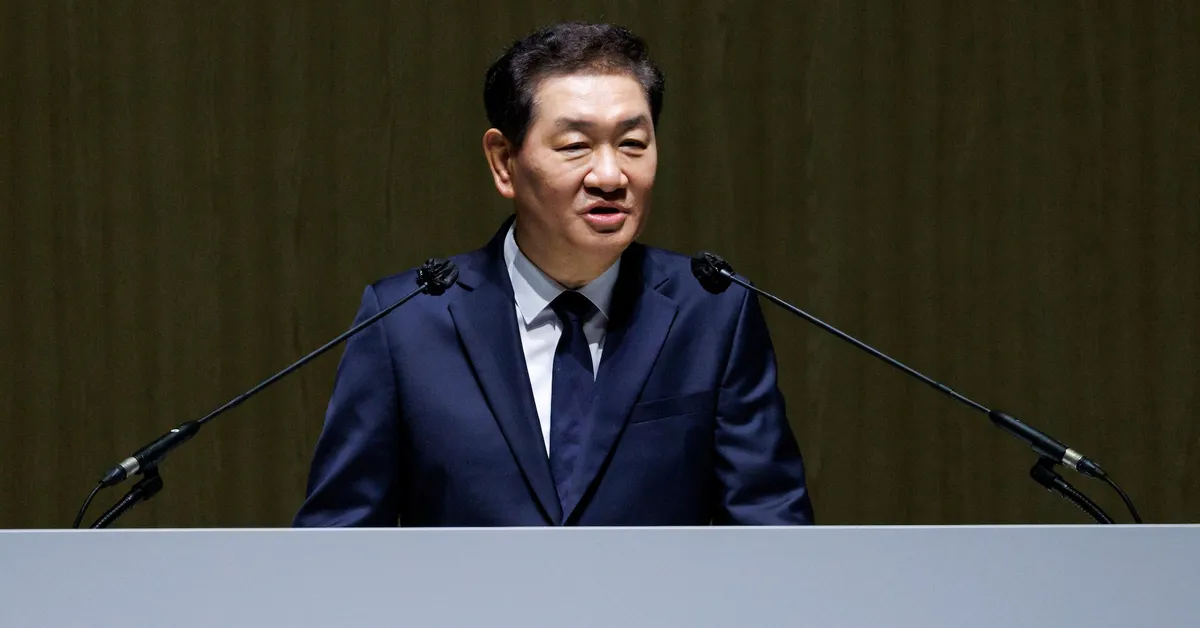
SEOUL, March 25 (Reuters) - In a tragic development, Samsung Electronics announced on Tuesday that its co-CEO, Han Jong-hee, has passed away due to a heart attack. This unforeseen event leaves Jun Young-hyun, the newly-appointed CEO, solely in charge of the tech giant as it endeavors to revitalize its underperforming chip business while navigating ongoing trade uncertainties.
Han, aged 63, took the helm as chief executive officer of South Korea's largest company in 2022. He was also responsible for overseeing the consumer electronics and mobile devices division. According to a stock exchange filing, Samsung confirmed that Jun would assume the role of sole CEO following Han's untimely death. A company spokesperson revealed that Han, who was also a board member, succumbed to cardiac arrest while receiving treatment at a hospital.
Currently, Samsung has not made a decision regarding a successor. Traditionally, the company has operated under a co-CEO structure, which effectively divides oversight of its consumer electronics and chip divisions. Han's nearly four-decade career at Samsung was marked by significant contributions, particularly in the television sector.
Industry analysts have noted that Han was instrumental in establishing Samsung’s TV business as a dominant force on the global stage. His sudden passing could have lasting implications for the company's business strategy, especially in marketing and product development. According to an anonymous analyst, Han's absence could hinder Samsung's efforts to enhance the performance of its home appliance division, particularly given the current landscape of rising tariffs and escalating trade conflicts.
This year has already proven challenging for Samsung. At a recent shareholder meeting, which Han chaired, he candidly expressed that 2025 would be a difficult year for the company. He assured investors that Samsung would adapt its global supply chain and manufacturing strategies in response to U.S. tariffs imposed during Donald Trump's administration. During this meeting, Han and other executives faced tough questions from shareholders regarding the company's failure to capitalize on the AI boom, which contributed to its status as one of the worst-performing tech stocks last year.
Han acknowledged the company's shortcomings, stating, "I sincerely apologize for the recent stock performance not meeting your expectations. Over the past year, our company failed to adequately respond to the rapidly evolving AI semiconductor market." He was scheduled to attend the launch event for new home appliances on Wednesday, which further underscores the abruptness of his passing.
In light of recent challenges, sources indicate that Samsung is also exploring opportunities within the automotive electronics sector to stimulate new growth avenues. However, the company has refrained from commenting on Lee Jae-Yong's ongoing trip to China. Lee, who has faced a series of lawsuits and scandals over the past decade, is the son of the late Lee Kun-hee, who suffered a heart attack in 2014. In February, Lee was acquitted of charges related to his succession of the family-owned conglomerate, although prosecutors have since appealed the court's decision.
As Samsung Electronics moves forward, the company faces the dual challenge of adjusting its leadership structure and addressing the pressing issues impacting its core business operations.